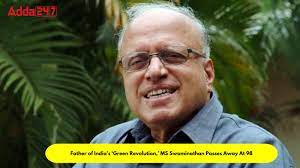
MS Swaminathan, father of India's Green Revolution, passes away
MS Swaminathan, father of India's Green Revolution, passes away
This topic is related to Current Affairs of IAS/PCS Prelims Exam and Main Exam General Studies Question Paper-3 Green Revolution.
Sept. 29, 2023
In News:
- Recently, MS Swaminathan, the father of Green Revolution in India, passed away in Chennai.
- MS Swaminathan died on September 28, 2023 in Chennai, Tamil Nadu at the age of 98.
About MS Swaminathan:
- MS Swaminathan was an Indian geneticist who is considered the father of India's Green Revolution.
- MS Swaminathan's full name was Mankombu Sambasivan Swaminathan.
- He was born on 7 August 1925 in Kumbakonam,Tamil Nadu.
- Swaminathan was a graduate of both Zoology and Agriculture.
His major contributions in agriculture sector:
- During the famine of 1960, Swaminathan, along with American scientist Norman Borlaug and many other scientists, also developed high yielding variety (HYV) seeds of wheat.
- He played an important role in developing high yielding varieties of paddy.
- Apart from this, in 1966, high quality wheat seeds were developed by hybridizing Mexican seeds with domestic varieties of Punjab.
- MS Swaminathan, his groundbreaking work in agriculture changed the lives of millions of people and ensured food security for the country.
- This helped ensure that India's low-income farmers produced more crops.
His major achievements:
Mankombu Sambasivan Swaminathan was honored with the following awards:
- MS Swaminathan was awarded Padma Shri in 1967, Padma Bhushan in 1972 and Padma Vibhushan in 1989 by the 'Government of India' in the field of 'Science and Engineering'.
- In 1965, Swaminathan was awarded the Mandal Memorial Medal from the Czechoslovak Academy of Sciences.
- Awarded the Ramon Magsaysay Award in 1971 and the Albert Einstein World Science Award in 1986.
- Received the first 'World Food Prize' in 1987 and America's Tyler Award for environmental achievement in 1991.
- Swaminathan was recognized by Time magazine as one of the twenty most influential Asians of the 20th century and one of only three from India, the other two being Mahatma Gandhi and Rabindranath Tagore.
His major roles:
- MS Swaminathan served as Director of the Indian Agricultural Research Institute from 1961 to 72.
- He was the Director General of the Indian Council of Agricultural Research from 1972 to 1979 and the International Rice Research Institute from 1982 to 1988.
- Considered the architect of India's Green Revolution, he played a major role in introducing and further developing high-yielding varieties of wheat and rice.
- He was a member of the Planning Commission during the Sixth Five Year Plan (1980-85).
M S Swaminathan Research Foundation
- M S Swaminathan established a 'M S Swaminathan Research Foundation' in Chennai in the early 1990s for 'sustainable agriculture and rural development'.
- The main objective of this Research Foundation was to promote a strategy for economic development in Indian villages that provides employment based on the development and dissemination of nature and women-friendly technology.
National Farmers Commission
- Swaminathan Commission was constituted on November 18, 2004. Actually, the name of this commission is National Farmers Commission and its chairman was MS Swaminathan. This commission was named Swaminathan Commission after his name.
- After understanding the problems of farmers for a long time, this commission had demanded many important reforms in the agricultural sector from the Centre.
Statement about him:
- In the words of Prime Minister Narendra Modi, 'Swaminathan, the father of the Indian Green Revolution, was committed to the welfare of farmers till the end of his life.'
- Mahatma Gandhi had said about M S Swaminathan “If God appears in the form of bread to the poor and the hungry, then it is Lord Dr. Swaminathan whom every citizen should worship while eating his daily meal.
-----------------------------------------
main exam questions
Professor Swaminathan's demise marks the end of an era of agricultural research, education and extension that was full of disruptive innovation. Discuss.